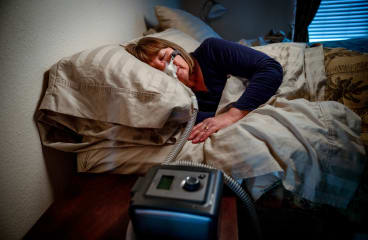What is sleep apnea?
Sleep apnea means that you frequently stop breathing for 10 seconds or longer during sleep. It can be mild to severe, based on the number of times an hour that you stop breathing or have slowed breathing.
Blocked or narrowed airways in your nose, mouth, or throat can cause sleep apnea. Your airway can become blocked when your throat muscles and tongue relax during sleep.
You can help treat sleep apnea at home by making lifestyle changes. You also can use a CPAP breathing machine that keeps tissues in the throat from blocking your airway. Or your doctor may suggest that you use a breathing device while you sleep. It helps keep your airway open. This could be a device that you put in your mouth. In some cases, surgery may be needed to remove enlarged tissues in the throat.
What are the symptoms of sleep apnea?
The main symptoms of sleep apnea are feeling extremely sleepy during the day, not feeling rested after a night's sleep, or waking up with a headache. Your bed partner may notice that during sleep you stop breathing, often snore loudly, gasp or choke, or toss and turn.
How is sleep apnea diagnosed?
Your doctor will probably examine you and ask about your past health. Your doctor may also ask you or your bed partner about your snoring and sleep behavior and how tired you feel during the day. Your doctor may suggest a sleep study. You may also have other tests to find out what's causing it.
How can you care for yourself when you have sleep apnea?
You may be able to treat mild sleep apnea by making changes in how you live and the way you sleep. For example, it may help to:
- Lose weight if you are overweight.
- Sleep on your side, not your back.
- Avoid alcohol and medicines such as sedatives before bed.
You may also try an oral breathing device. It helps keep your airways open while you sleep.
Sleep apnea: When to call
Watch closely for changes in your health, and be sure to contact your doctor if:
- You still have sleep apnea even though you have made lifestyle changes.
- You are thinking of trying a device such as CPAP.
- You are having problems using a CPAP or similar machine.
- You are still sleepy during the day, and it affects your daily life.

